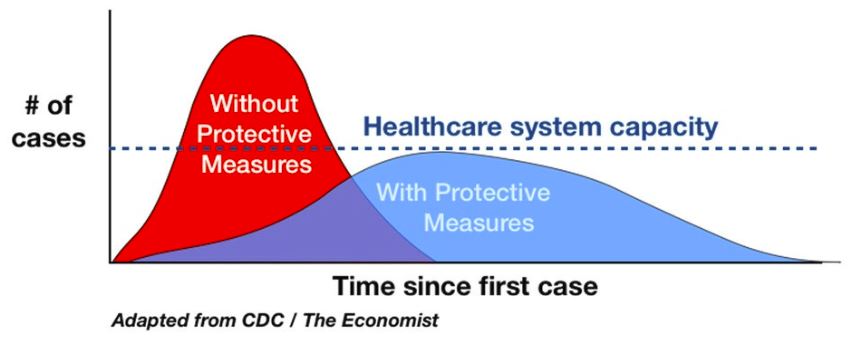News
STA, 12 March 2020 - Slovenia declared a coronavirus epidemic on Thursday as the number of cases continued to surge with 96 persons confirmed to have fallen ill, almost double the number from the day before. A number of measures were taken to contain the spreading, from school closures to cancellations of virtually all public events, with additional measures announced.
The declaration of the epidemic, which took effect at 6pm, gives the government and public health authorities more leeway in organising the response effort and coordinating the actions of the civil protection and emergency services.
A national emergency response plan will be set in motion and the admission and treatment of patients will be changed.
To help the health system cope with the influx of new cases, all but the most urgent procedures at all health institutions have been cancelled as of Monday, including all prevention, Health Minister Aleš Šabeder said.
The authorities have decided to start admitting patients to regional hospitals since major health centres are becoming overwhelmed.
Related: How Many Hospital Beds Are There In Slovenia?
A special decree has been adopted that in effect suspends most labour rights of health staff, who will not be allowed to go on strike, take annual leave or travel abroad.
Another major decision is the closure of all educational establishment across the entire country. The shutdown becomes effective on Monday and schools have been told to skip regular instruction on Friday in favour of providing a basic care service for the children as they prepare to move classes online and reorganise the curriculum. Some schools will close tomorrow.
Companies and public institutions have been advised to organise telecommuting to the maximum extent possible to contain the spread.
Since many businesses will be strongly affected by the gradual winding down of public life, the outgoing government has adopted a bill under which it will co-finance the pay of workers who will be temporarily laid off or quarantined.
EUR 50 million has been set aside and more will be provided as necessary. Outgoing Labour Minister Ksenija Klampfer said that the legislation would be fast-tracked in the National Assembly.
Major sporting events have been cancelled as well. The Alpine Ski World Cup event, scheduled to take place in Kranjska Gora at the weekend, was cancelled and the Ski Flying World Championships at Planica, scheduled for 19-22 March, postponed. The Football Association has suspended all games.
The measures put Slovenia ahead of the curve of most other European countries and given the proximity of European coronavirus hotspot Italy they are seen as essential to slow the epidemic, but many have criticised the response as inadequate.
Infectious disease specialists at Slovenia's largest hospital, UKC Ljubljana, issued an urgent appeal for public life to be brought to a standstill. They want bans on all gatherings in public including in cinemas, museums and bars, and urged people to stay indoors in order to prevent the epidemic from unfolding the way it has in Italy.
Additional measures are bound to be adopted soon as Janez Janša, the new prime minister, endorsed the appeal and announced new measures as soon as the new government takes office tomorrow evening.
One of the first things the government plans to do is set up a dedicated crisis headquarters to manage the coronavirus response. Due to the closure of kindergartens and schools, daycare would be provided as a matter of priority for employees working in critical industries such as healthcare, energy, public utilities and security services.
Military capabilities including two field hospitals will be activated as well since the health system is expected to be overstretched soon, providing additional beds for patients, according to Matej Tonin, the incoming defence minister.
All our stories on COVID-19 and Slovenia can be found here. If this subject is of continued interest just bookmark that link and we'll have confirmed news up as soon as we see it.
STA, 12 March 2020 - The incoming Janez Janša government announced sweeping lockdown measures it plans to take immediately after assuming office after infectious disease specialists issued an urgent appeal Thursday for public life to be brought to a standstill due to the coronavirus epidemic.
Doctors called on the outgoing and incoming government to shut down educational institutions immediately, not on Monday as planned, and extend the closure to all places where people gather, including cinemas, museums and bars. They urged people to stay indoors in order to prevent the epidemic from unfolding the way it has in Italy.
Janša told the press the new government supported the appeal and would form a crisis centre at its first session after it takes office on Friday evening.
All our coronavirus and Slovenia stories are here – just bookmark that link and check for updates
One of the first things the government plans to do is to reduce the number of entry points where people are tested for coronavirus.
Janša said people should work from home where possible, including in the public administration. Due to the closure of kindergartens and schools, daycare would be provided as a matter of priority for employees working in critical industries such as healthcare, energy, public utilities and security services.
But regardless of how efficient these measures are, "the capacity of the Slovenian health system will be put to the test, which is why our effort will be targeted at securing additional capacities."
For infected persons who are not in critical condition, accommodation capacities would be provided in facilities such as military installations, hotels and student dormitories.
Matej Tonin, the incoming defence minister, added that Debeli Rtič, a large Red Cross resort on the coast, could potentially be used to accommodate persons who need to self-isolate but do not have the ability to do so at home.
The army has a field hospital with 25 beds, which is currently in Maribor but can be transferred to any location if needed within 48 hours. Another mobile unit with 120 beds is on store at the Institute for Commodity Reserves. "With these two mobile units we can provide an extra 145 beds," Tonin said.
Additionally, the army has been asked to designate one of its barracks to provide an additional 300 beds if necessary. It should be clear by Friday morning which barracks will be chosen.
The government ordered two million surgical face masks yesterday. Today China offered via diplomatic channels to help with protective equipment. Tonin said a list of things that Slovenia would ask China for was already being drawn up.
SBI Top index has record fall
STA, 12 March 2020 - The SBI TOP index on the Ljubljana Stock Exchange lost almost 9% to 753.70 points on Wednesday, the largest daily drop since it was launched in 2006, as major issues lost in excess of 10% on coronavirus concerns.
Drug maker Krka dropped 10.3% to EUR 57.20 and NLB bank was down 10.5% to EUR 47.60. Insurance stocks also took a pounding as Sava Re lost 10.6% to EUR 16 and Zavarovalnica Triglav was down 9.4% to EUR 27.
Energy group Petrol lost in excess of 7% to close at EUR 316 and Telekom Slovenije was down 9.2% to EUR 47.
Trading was brisk as total volumes exceeded EUR 6 million.
All our coronavirus and Slovenia stories are here – just bookmark that link and check for updates, which will slow down when things come to a standstill
STA, 12 March 2020 - Outgoing Prime Minister Marjan Šarec announced that an epidemic would be declared in Slovenia on Thursday based on fresh data on the spreading of coronavirus in Slovenia. Restrictions will also be imposed on cargo transport as of Monday, when all educational institutions will be closed as well.
The number of confirmed coronavirus cases in Slovenia rose by 25 from yesterday to 82 by 9am today.
Related: How many hospital beds are there in Slovenia?
Šarec said other countries had not declared epidemics yet but Slovenia had decided for the move to better coordinate actions of the civil protection and other services.
According to Nina Pirnat of the National Public Health Institute (NIJZ), the epidemic has also been declared because all regions are affected and the number of cases is rising beyond the level considered normal.
Health Minister Aleš Šabeder noted that two new areas with infections were Nova Gorica and Kranj. In the two towns, one case each was imported from Italy.
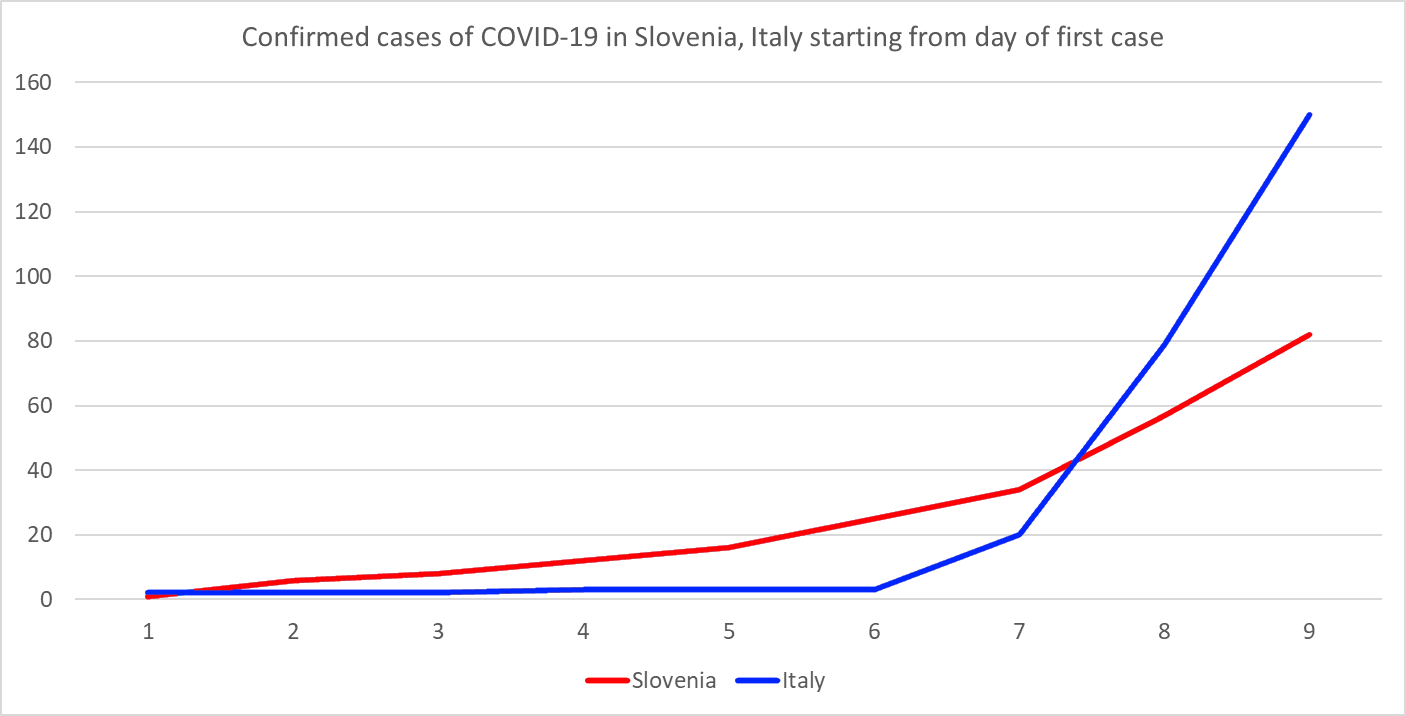
Chart: JL Flanner, made using official data
Where is COVID-19 in Slovenia?
Two major clusters of infection remain Ljubljana with 17 cases stemming from the first case, and Metlika in the south-east, where the virus has spread to 11 people.
The rest 21 patients were infected abroad. In 32 cases, testing is still under way.
In the Celje region, the number of cases rose from one to three since yesterday, Koper has three cases today, in Ljubljana the number went up from 31 to 44, in Maribor from 5 to 7, Murska Sobota from two to three, in Novo Mesto from 15 to 20, and Nova Gorica and Kranj each have one case as of today.
In Šempeter, testing is still under way.
Šarec said the problem in Slovenia was that much bigger because of the number of infections among medical staff. As of 5pm today all medical staff would be banned from travelling to infected areas under a special government decree, Health Minister Aleš Šabeder said.
Šarec urged citizens to stay united, refrain from criticism of state measures or discrimination of those infected by the virus.
All our stories on COVID-19 and Slovenia are here
International attention rarely turns to Slovenian politics, but whenever it does there’s been at least one constant for more than three decades – Janez Janša, the man who will soon become Slovenia’s Prime Minister for the third time. What’s more, at a robust and vigorous looking 61, he’s likely to be on the scene for years to come.
Janša is, to put it mildly, a polarising figure. Starting public life as writer for Mladina, and going to jail for his actions against the Communist authorities of Yugoslavia, he was, like Orbán in Hungary, widely seen as a force for good in the years around the end of the Iron Curtain. Indeed, if you want to see how cool he was in the late 1980s then check out this 1989 clip from the UK’s Rough Guide to Slovenia, with more clips from the show here.
In that segment on Mladina you’ll also see Marcel Štefančič Jr., a familiar face on television with his long grey hair and ponytail, both absent at the time of filming. And it’s Štefančič that Politico turn to for some context in their profile of Janša, titled “Slovenian strongman back at EU top table”, a reference to the fact that Slovenia will hold the EU Presidency in the second half of the year (for the second time, with the first being in 2008, when Janša was also Prime Minister, and Europe also faced a crisis).
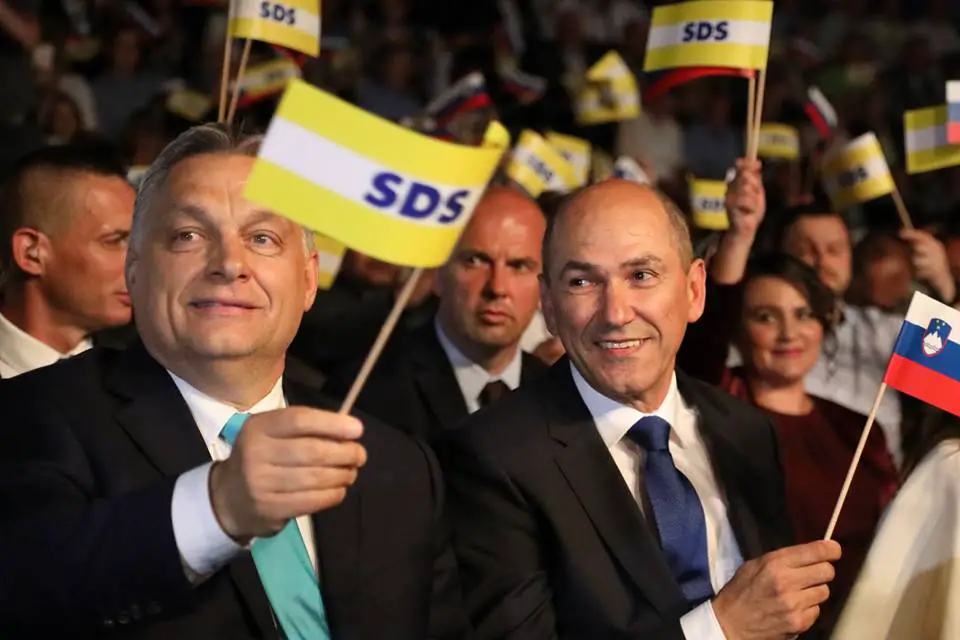
Orbán and Janša at an SDS rally. Facebook
As all non-Slovene articles about Janša seem to do, the emphasis is put on his relationship with Viktor Orbán, as well as the similarities and differences between the two men. The overall statement is that Janša “plays to win”, with Štefančič claiming that his former co-worker is “a little bit of Trump, a little bit of Boris Johnson, a little bit of Orbán.” Štefančič goes on to express some concern that Slovenia could follow Hungary down the path of “illiberal democracy”, noting that if Janša decided to do so “I don’t think the other parties that are in coalition with him would stop him.”
However it’s that coalition that Ali Žerdin, of the newspaper Delo, sees as a limiting factor on any great changes to society. Žerdin claims that the parties joined the coalition for fear of being wiped out in a snap election, and thus they preferred to help Janša gain power, keep him in check, and position themselves for the next elections, due in mid-2022 at the latest.
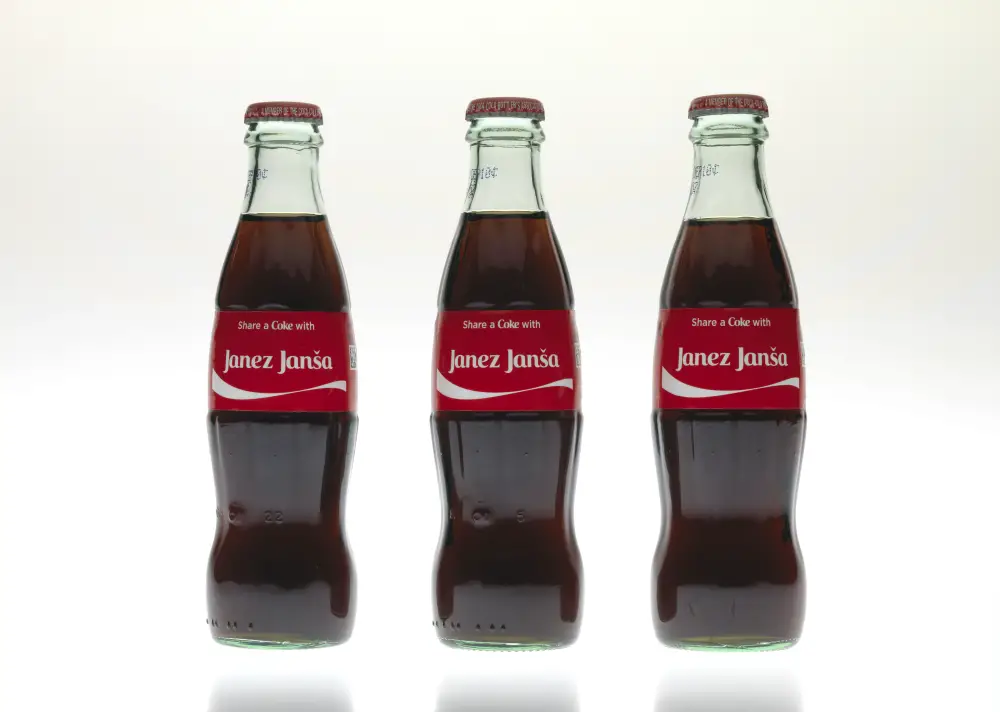
The art world in particular likes playing with Janša, and Janša finds much to excite his supporters with in the art world. There are actually three artists known as Janez Janša, while the Prime Minister himself was born Ivan Janša.
The article goes on to give more background on Janša, and why those in the centre and on the left who have followed his career for decades have some concerns about what’s coming next, particularly with regard to interference in the media. You can read the whole thing here, and – if you’d like to get some idea of what the next Prime Minister is like then you can see his very active, in English and Slovene, Twitter account here.
All our stories on Janez Janša can be found here
St. Gregory's day is Slovenian St. Valentine's, a day of lovers, as according to folk traditions this is the day of bird nesting. Unmarried girls thus would look into the sky on this day, as the first bird they saw would suggest what their future husband would be like.
St Gregory's is named after Pope Saint Gregory the Great (app. 540 - 604), who according to folk traditions brings spring, light and the sun.
Until 1582, when the Gregorian calendar was introduced, the first day of spring was marked on March 12.
On March 12 there was already light enough that the blacksmiths of Kropa did not need torches or candles for their work anymore, which they celebrated by throwing burning objects into the local stream, which later evolved into children sending little ships and huts (little gregories) down the water.
In these days let the road take you to ? Tržič, where during ? Gregorjevo (Saint Gregory´s Day) there's a habit of send lights down the river ?️, which is 100 of years old. @visit_trzichttps://t.co/hX6gBnNWXn#ifeelsLOVEnia #itsculturetime pic.twitter.com/82tKgj0MQw
— Feel Slovenia (@SloveniaInfo) March 9, 2020
Updated at 13:50
STA, 12 March 2020 - Outgoing Prime Minister Marjan Šarec announced on Thursday he had tasked the health and education ministries with making all the necessary preparations for the closing down of all schools in Slovenia in the face of coronavirus as of Monday.
"It's a measure that will have many consequences but it is a must in this situation," Šarec said on Twitter.
Ministry of Education data show over 260,000 children and youngsters will have to stay home.
Outgoing Labour Minister Ksenija Klampfer said those who would be forced to stay at home to look after their children would receive compensation in the amount of 50% of pay.
Tomorrow, only child care will be organised at schools, so children are advised to stay at home if possible, Education Minister Jernej Pikalo said.
He added that options were being discussed for long-distance learning with public broadcaster RTV Slovenija, internet provider for public institutions Arnes and other stakeholders.
Outgoing Health Minister Aleš Šabeder warned that the measure would also affect the healthcare system, as many medical workers who have children will have to stay at home. He said measures to reorganise work at health institutions were already in the making.
Since the virus has spread to all of Slovenia's regions and the number of infected persons is rising, the country will declare an epidemic today.
Two schools where infections have been confirmed are already closed.
The first to close was the Fran Albreht Primary School in Kamnik on Wednesday, where a teacher had tested positive for the virus.
Two cases were also confirmed at the Šmarje pri Jelšah primary school, which is closed as of today.
Several European countries have opted for school and kindergarten closures to prevent the spreading of the new virus, including Austria as on next week and partly Croatia.
In Italy, which is the European coronavirus hotspot, schools have been closed since 5 March.
University lectures at the University of Primorska were cancelled for the next two weeks on Sunday, while the University of Ljubljana cancelled them on Wednesday until further notice.
At the University of Maribor only lectures with less than 100 people are allowed, while some faculties have opted for distance learning.
The government introduced several protective measures in the last few days to contain the virus, which has so far infected at least 82 people in Slovenia. Indoor events with more than 100 visitors are banned and health checks have been put in place on the border with Italy. The checking of passengers at Ljubljana airport is to start in the coming days.
All our stories on coronavirus are here
Check the date at the top of the page, and you can find all the "morning headlines" stories here. You can also follow us on Facebook and get all the news in your feed.
A schedule of all the main events involving Slovenia this week can be found here
This summary is provided by the STA:
Slovenia steps up containment efforts as coronavirus cases surge
LJUBLJANA - Slovenia stepped up containment activities as the number of coronavirus cases rose by 23 to 57. Spot checks were introduced at six points along the border with Italy, and all other road links with Italy have been closed and passenger train service suspended. Cargo transport will not be affected for now. A primary school in Kamnik was meanwhile shut down for two weeks after a teacher tested positive, and hospitals expanded precautionary measures as infections among health staff rose. There have been no fatalities so far, but that may soon change. One of the first individuals to test positive was transferred to intensive care today.
Slovenia may get new government on Friday
LJUBLJANA - Slovenia may get a new government Friday evening. The agenda for a college of deputy leaders called for Friday includes an extraordinary session of the National Assembly to appoint the cabinet. The session is to be called for 6:30pm the same day. Thus the government is to be appointed almost immediately after the last of the ministerial candidates are quizzed by relevant bodies on Friday.
Incoming finance minister indicates fiscal policy may be loosened
LJUBLJANA Andrej Šircelj, candidate for finance minister in the incoming Janez Janša government, indicated at his committee hearing that the new government would pursue a more expansionary fiscal policy if needed to counter the adverse effects of the coronavirus, even though sustainable public finances would be a top priority. Šircelj, who was confirmed in a 11:8 vote by the Finance Committee, said the overarching goal of the new treasury would be to ensure the stability and sustainability of public finances, which are in a "favourable position" with surpluses planned for this year and next and debt projected to decrease.
Interior minister candidate says border protection a priority
LJUBLJANA - Interior minister candidate Aleš Hojs told the relevant parliamentary committee that effective protection of borders, not only because of migrants but also the coronavirus, and reduction of administrative burdens on police would be his first priority in the emerging government of Janez Janša. The member of the Democrats (SDS) told the Home Affairs Committee, which confirmed him with a 11:8 vote, that additional fencing should be erected on the border with Croatia and that stronger fences should be erected along all sections where the largest new wave of migrants was expected. He believes that in order to effectively protect the southern border, the police needs to be given additional powers, which would require changing two to three relevant laws.
Prospective minister says public administration wage system not stimulative
LJUBLJANA - The prospective new public administration minister Boštjan Koritnik, who was endorsed in a parliamentary committee hearing on Wednesday, announced he would continue with efforts to address pay anomalies in the public sector. Koritnik wants a more flexible and stimulative pay system and better services. The 40-year-old assistant professor at the Ljubljana Faculty of Law, who was backed in an 11:7 vote, said that trade unions should be included in the efforts, since "we have not come here to destroy the system in the sector but to upgrade it".
Agriculture Ministry to stay the course under Pivec
LJUBLJANA - Aleksandra Pivec will stay on as agriculture minister in the new government and in her hearing at the Agriculture, Forestry and Food Committee on Wednesday she outlined what amounts to a continuation of her current course. The focus will be on strengthening agriculture, preserving the countryside and following the latest trends in the field. Pivec, who was endorsed in a 11:5 vote, said the countryside must be "settled, preserved and farmed", while special attention must be dedicated to the increasing age of farmers.
SDS sues Šarec over Hungary financing comments
LJUBLJANA - The Democratic Party (SDS) brought a defamation suit against outgoing Prime Minister Marjan Šarec over what it says are his untruthful and insulting allegations that the party was being financed from Hungary. Lawyer Franci Matoz filed the lawsuit on behalf of the party after the SDS threatened Šarec with a damages suit in mid-February unless he retracted certain of his comments.
Bill to crack down on militias struck down
LJUBLJANA - The parliamentary Home Affairs Committee struck down legislative amendments proposed by the outgoing government in order to outlaw the activity of self-styled village guards or militias patrolling the border with the intention to stop illegal migrants. On the second reading, the committee voted five to ten against amendments to the protection of public order act and six to ten against amendments to the state border control act.
Slovenia's exports up 10.6% in January, imports rise by 5.2%
LJUBLJANA - Slovenia exported EUR 3 billion worth of goods in January while it imported EUR 2.8 billion. Exports were up 10.6% and imports 5.2% in year-on-year comparison, the Statistics Office said. The export/import ratio was 107.5%. A surplus in external trade was recorded year-on-year for January for the seventh consecutive time and it now reached the highest January level with EUR 207.4 million.
Cinkarna Celje reports lower 2019 profit
CELJE - Cinkarna Celje, the Celje-based chemical company, saw its net profit plunge by 29% last year to EUR 21.7 million as revenue rose by 5% to EUR 172.6 million. In a regulatory filing with the Ljubljana Stock Exchange, the management labelled the company's performance as successful and substantially above projections, despite the global economic uncertainty.
Visiting Ljubljana? Check out what's on this week, while all our stories on Slovenia, from newest to oldest, are here
If you're learning Slovenian then you can find all our dual texts here
STA, 11 March 2020 - The number of confirmed coronavirus cases in Slovenia rose by 23 since Tuesday afternoon to 57 by 2pm on Wednesday. The first school was closed after a teacher tested positive and strict measures were put in place at the Ljubljana maternity hospital where several cases were confirmed as well. So far, 2,270 persons have been tested.
The Fran Albreht Primary School in Kamnik has been closed for two weeks after a teacher tested positive, but Education Minister Jernej Pikalo announced that "given the large number of negative effects on the life of the community and on the economy, the closure of schools is a measure we will be using only after careful reflection and consultations with experts".
New confirmed cases, standing at six at the time of a press conference held at noon, were reported for UKC Ljubljana. According to the hospital's director Janez Poklukar, the infected are mostly part of UKC's leadership and have had little contact with patients.
However, with five case reported for the hospital's gynaecology department, restrictions were upgraded there - fathers will for instance not be able to be present during birth, and all non-urgent check-ups will be cancelled. The dental clinic also has one confirmed case and is operating in restricted mode.
Šabeder explained that all preventive programmes in the healthcare system would be put on hold and staff relocated to where it is needed most.
The government has also decided to put head of the Civil Protection and Disaster Relief Administration Srečko Šestan in charge of efforts to contain the virus.
Meanwhile, National Public Health Institute (NIJZ) director Nina Pirnat explained the institute was following all primary infections, while it was also noticing secondary, tertiary and quandary transmissions.
She reported that one infection had also been confirmed among the residents of the Metlika (SE) elderly home.
The UKC Ljubljana hospital said on Twitter today, it was treating 20 coronavirus patients at the moment.
While Slovenia remains without a death case due to coronavirus, one of the first individuals to test positive was transferred to intensive care today. However, UKC director Janez Poklukar explained that the patient was in critical condition because of a different issue, although the virus was not helping.
The other 19 patients are stable and at least two of them are expected to be released to home care soon, the hospital said.
UKC Maribor medical director Matjaž Vogrin said that all the patients hospitalised over COVID-19 in Slovenia were experiencing milder symptoms of the disease and that nobody needed intensive care for now.
All our stories on coronavirus and Slovenia are here
Croatian police have informed the Slovenian Traffic Information Center that the country is now rejecting all vehicles arriving from Italy at its border crossings.
As such, an increased number of heavy vehicle traffic jams are reported at the border crossings to Croatia, with the line at Obrežje border crossing now being 13-km long. Truck drivers are having to wait in the righthand lane for more than eight hours to exit the country and seven hours to enter.
At Dragonja and Metlika border crossings the waiting line for heavy vehicles to exit the country is a little shorter, at around two hours.
You can follow the conditions at the Traffic Information Centre’s English Website.
The danger of complacency over COVID-19 is that the infection spreads too quickly and hospital beds, along with healthcare workers’ schedules, get full to capacity, leaving little or nothing for patients with other conditions. This raises the possibility – as seen in Italy – of the system thus focusing attention on those most likely to recover, and letting the illness take its course among others (the older, the sicker).
All our coronavirus stories are here
In short, if you’re young and in general good health, your personal safety should not be a concern. More important is the safety of those around you – the old and sick who are more likely to die from COVID-19, as well as those, yourself included, who might need an emergency trip to the hospital in the next few months. The idea, as expressed in this widely shared image, is to spread out the epidemic and not overwhelm the healthcare system, both formal and informal.
But how many hospital beds are there in Slovenia, and how do the numbers compare with other countries?
Using Eurostat data for 2017, there are a total of 2.6 million hospital beds in the EU28 (including the UK), counting those for curative care, long-term care and rehabilitative care, of which just 9,294 are in Slovenia, compared to 661,448 in Germany. Of course, Slovenia has a much smaller population, two million vs 82.8 million, so let’s look at the number of hospital beds per 100,000 people. Here Germany has 800 beds for every 100,000 people, or eight for every 1,000. In contrast, Slovenia has 449 beds for every 100,000 residents, or 4.49 for every 1,000, just between Malta and Switzerland.
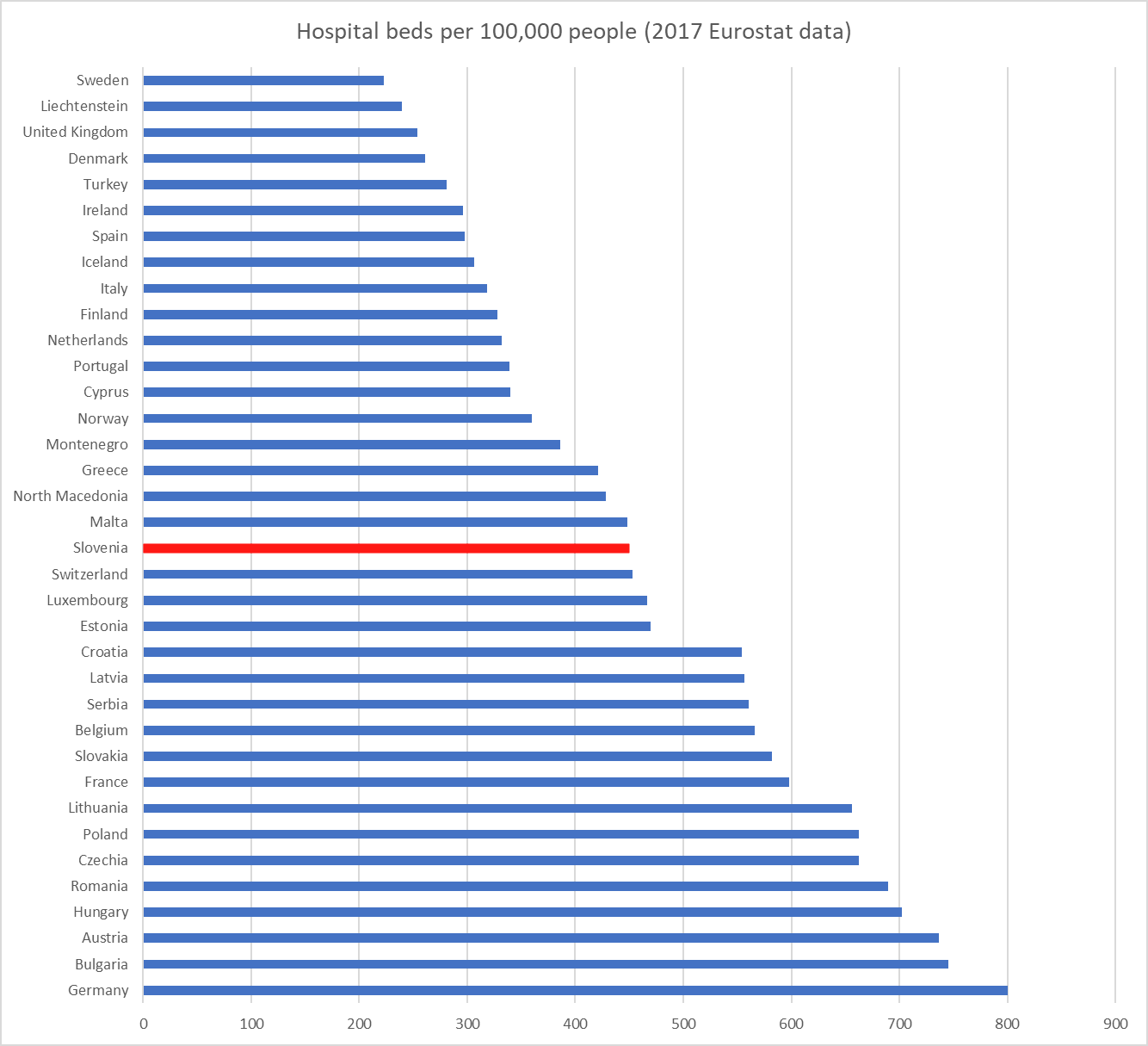
The full list of countries, and beds per 100,000 people, is shown below, and note that no data was given for Albania. The Eurostat data can be explored further here.
Austria | 737 |
Belgium | 566 |
Bulgaria | 745 |
Croatia | 554 |
Cyprus | 340 |
Czechia | 663 |
Denmark | 261 |
Estonia | 469 |
Finland | 328 |
France | 598 |
Germany | 800 |
Greece | 421 |
Hungary | 702 |
Iceland | 306 |
Ireland | 296 |
Italy | 318 |
Latvia | 557 |
Liechtenstein | 240 |
Lithuania | 656 |
Luxembourg | 466 |
Malta | 449 |
Montenegro | 386 |
Netherlands | 332 |
North Macedonia | 428 |
Norway | 360 |
Poland | 662 |
Portugal | 339 |
Romania | 689 |
Serbia | 561 |
Slovakia | 582 |
Slovenia | 450 |
Spain | 297 |
Sweden | 222 |
Switzerland | 453 |
Turkey | 281 |
United Kingdom | 254 |
STA, 11 March 2020 - Slovenia exported EUR 3 billion worth of goods in January while it imported EUR 2.8 billion. Exports were up 10.6% and imports 5.2% in year-on-year comparison, the Statistics Office said on Wednesday. The export/import ratio was 107.5%.
A surplus in external trade was recorded year-on-year for January for the seventh consecutive time and it now reached the highest January level with EUR 207.4 million.
Slovenia recorded a slight drop in external trade with EU countries, as exports to these countries decreased by 0.8% and imports from them by 2.2% compared to January 2019.
The value of exported goods reached EUR 2 billion and of imported goods EUR 1.9 billion. Slovenia generated 68% of exports and 68.9% of imports in trade with EU countries.
Meanwhile, both exports and imports with non-EU countries were up, by 46.4% to EUR 954.5 million and by 26.5% to EUR 862.6 million, respectively.
The country generated a surplus of EUR 91.9 million in trade with non-EU countries, mostly on account of a rise in trade with Switzerland.
For quite a while, trade in pharmaceutical products with Switzerland has been on the rise since the Swiss pharma giant Novartis opened a logistics and distribution hub at Ljubljana airport serving this part of Europe.
You can see more of this data on SURS


